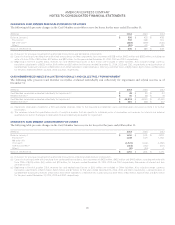American Express 2014 Annual Report Download - page 88
Download and view the complete annual report
Please find page 88 of the 2014 American Express annual report below. You can navigate through the pages in the report by either clicking on the pages listed below, or by using the keyword search tool below to find specific information within the annual report.
AMERICAN EXPRESS COMPANY
NOTES TO CONSOLIDATED FINANCIAL STATEMENTS
NOTE 6
ASSET SECURITIZATIONS
The Company periodically securitizes Card Member receivables and loans arising from its card business through the transfer of those assets
to securitization trusts. The trusts then issue securities to third-party investors, collateralized by the transferred assets.
Card Member receivables are transferred to the American Express Issuance Trust II (the Charge Trust). Card Member loans are
transferred to the American Express Credit Account Master Trust (the Lending Trust). The Charge Trust and the Lending Trust are
consolidated by American Express Travel Related Services Company, Inc. (TRS), which is a consolidated subsidiary of the Company. The
trusts are considered VIEs as they have insufficient equity at risk to finance their activities, which are to issue securities that are collateralized
by the underlying Card Member receivables and loans. Details on the principles of consolidation can be found in the summary of significant
accounting policies (refer to Note 1).
TRS, in its role as servicer of the Charge Trust and the Lending Trust, has the power to direct the most significant activity of the trusts,
which is the collection of the underlying Card Member receivables and loans in the trusts. In addition, TRS, excluding its consolidated
subsidiaries, owns approximately $1.2 billion of subordinated securities issued by the Lending Trust as of December 31, 2014. These
subordinated securities have the obligation to absorb losses of the Lending Trust and provide the right to receive benefits from the Lending
Trust, both of which are significant to the VIE. TRS’ role as servicer for the Charge Trust does not provide it with a significant obligation to
absorb losses or a significant right to receive benefits. However, TRS’ position as the parent company of the entities that transferred the
receivables to the Charge Trust makes it the party most closely related to the Charge Trust. Based on these considerations, TRS is the primary
beneficiary of both the Charge Trust and the Lending Trust.
ThedebtsecuritiesissuedbytheChargeTrustandtheLendingTrustarenon-recoursetotheCompany.SecuritizedCardMember
receivables and loans held by the Charge Trust and the Lending Trust are available only for payment of the debt securities or other
obligations issued or arising in the securitization transactions (refer to Note 3). The long-term debt of each trust is payable only out of
collections on their respective underlying securitized assets (refer to Note 9).
The following table presents the restricted cash held by the Charge Trust and the Lending Trust as of December 31, 2014 and 2013, included
in Other Assets on the Company’s Consolidated Balance Sheets:
(Millions) 2014 2013
Charge Trust $2$2
Lending Trust 62 56
Total $64$58
These amounts relate to collections of Card Member receivables and loans to be used by the trusts to fund future expenses and obligations,
including interest paid on investor securities, credit losses and upcoming debt maturities.
Under the respective terms of the Charge Trust and the Lending Trust agreements, the occurrence of certain triggering events associated
with the performance of the assets of each trust could result in payment of trust expenses, establishment of reserve funds, or, in a worst-case
scenario, early amortization of investor certificates. During the year ended December 31, 2014, no such triggering events occurred.
88
























